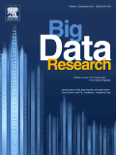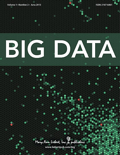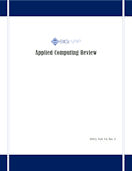
Big Data Research
Scope & Guideline
Catalyzing breakthroughs in analytics and management.
Introduction
Aims and Scopes
- Big Data Analytics:
The journal emphasizes the exploration of techniques and tools for analyzing large datasets, including statistical analysis, machine learning, and deep learning approaches. - Data Management Techniques:
Research on methods for effective data storage, retrieval, and processing, especially in distributed and cloud computing environments. - Applications in Various Domains:
The journal covers the application of big data techniques across various fields such as healthcare, agriculture, urban planning, and social sciences, showcasing interdisciplinary research. - Emerging Technologies:
Focus on innovative technologies like blockchain, IoT, and AI that enhance big data applications and their implications for society. - Visualization and Interpretation:
Studies on how to effectively visualize and interpret big data insights to facilitate decision-making processes in organizations.
Trending and Emerging
- AI and Machine Learning Integration:
There is an increasing trend towards integrating artificial intelligence and machine learning methods into big data analytics, focusing on automating processes and enhancing predictive capabilities. - Real-Time Data Processing:
Research focusing on real-time data analytics and processing is on the rise, driven by the need for immediate insights in applications like smart cities and healthcare. - Cross-Domain Application Studies:
Emerging themes highlight the application of big data techniques in various fields, showcasing interdisciplinary collaborations that address complex problems. - Ethical Considerations and Data Privacy:
As big data usage expands, there is a growing emphasis on ethical implications, privacy concerns, and the governance of data usage in research and applications. - Sustainability and Environmental Impact Analysis:
Research exploring the use of big data for sustainability and environmental monitoring is gaining traction, reflecting a societal shift towards addressing climate change and resource management.
Declining or Waning
- Traditional Statistical Methods:
There is a noticeable decline in the emphasis on classical statistical methods as researchers increasingly prefer machine learning and AI-driven approaches for big data analytics. - General Data Mining Techniques:
The focus on generic data mining techniques is decreasing as more specialized methods tailored to specific industries or applications gain prominence. - Single-Domain Studies:
Research that is confined to a single domain without interdisciplinary approaches is becoming less common, as the field shifts towards more integrated and collaborative studies across multiple domains.
Similar Journals

Journal of Web Engineering
Advancing the Frontiers of Web TechnologiesThe Journal of Web Engineering, published by RIVER PUBLISHERS, serves as a pivotal platform for researchers, professionals, and students interested in the expanding fields of web technologies and engineering. Since its inception in 2008, this journal has dedicated itself to advancing knowledge and promoting innovative practices in Computer Networks and Communications, Information Systems, and Software Engineering. With an impressive convergence of research up to 2024, its Q3 quartile ranking in both Computer Networks and Communications and Information Systems reflects the journal's commitment to the dissemination of high-quality, impactful research. Although it operates as a traditional access journal, it allows for vital contributions to be shared widely among a diverse readership. The Journal of Web Engineering's rankings in Scopus, including a percentile placement of 28th in Computer Networks and Communications, demonstrate its relevance and growing significance in the academic landscape. As the digital world continuously evolves, this journal remains a crucial resource for exploring the latest advancements and theoretical reflections within the realm of web engineering.

Informatics-Basel
Connecting Scholars, Shaping the Future of InformaticsInformatics-Basel is a leading international, peer-reviewed journal published by MDPI that has been at the forefront of disseminating high-quality research in the field of informatics since its establishment in 2014. Based in Switzerland, this Open Access journal strives to provide a platform for innovative studies across various domains, including Communication, Computer Networks and Communications, and Human-Computer Interaction, demonstrating its strong impact within these fields with impressive rankings: Q1 in Communication and Q2 in both Computer Networks and Communications and Human-Computer Interaction. Researchers and scholars are encouraged to contribute to the advancing dialogue on critical issues and emerging technologies, as evidenced by its esteemed Scopus rankings, placing it in the top percentiles of its respective categories. With its commitment to elevating knowledge accessibility, Informatics-Basel has become an essential resource for the academic community, stimulating collaboration and the sharing of ideas from 2014 to 2024 and beyond.

Frontiers in Big Data
Advancing Knowledge at the Intersection of AI and Information SystemsFrontiers in Big Data, published by Frontiers Media SA in Switzerland, is a leading open access journal that has established itself as a vital resource for scholars and practitioners in the expanding realms of artificial intelligence, computer science, and information systems since its inception in 2018. With an impressive impact factor reflected in its Q2 rankings across multiple categories, including Artificial Intelligence, Computer Science (Miscellaneous), and Information Systems, this journal serves as a pivotal platform for disseminating groundbreaking research and promoting interdisciplinary collaboration. The journal's commitment to open access ensures that high-quality research is readily accessible to a global audience, fostering the exchange of innovative ideas and advancements in big data technologies. By creating an inclusive space for diverse perspectives, Frontiers in Big Data aims to bridge the gap between theoretical research and practical application, making it an essential read for anyone invested in the future of data science.

Advances in Data Science and Adaptive Analysis
Driving Excellence in Adaptive Analysis and Methodologies.Advances in Data Science and Adaptive Analysis is a prestigious journal dedicated to the advancement of knowledge within the rapidly evolving fields of data science and adaptive analysis. Published by WORLD SCIENTIFIC PUBL CO PTE LTD, this journal aims to serve as a platform for researchers, professionals, and students to disseminate innovative findings and methodologies. With a focus on interdisciplinary approaches, it invites contributions that explore the application of adaptive techniques in tackling complex data-driven challenges. Situated in Singapore, the journal stands out for its commitment to high-quality research, making significant impacts in the academic community and beyond. Although the journal currently does not offer open access, it remains a crucial resource for those striving to push the boundaries of data science research and its practical applications.

International Journal of Agricultural and Environmental Information Systems
Innovating Solutions for a Greener TomorrowInternational Journal of Agricultural and Environmental Information Systems, published by IGI Global, is a leading platform for scholarly discourse bridging the domains of agriculture, environmental science, and information systems. With its ISSN 1947-3192 and E-ISSN 1947-3206, this esteemed journal has been pivotal in tackling key information challenges within these crucial fields since its inception in 2010, and it continues to evolve until 2024. Featuring articles ranked in the Q3 category for Information Systems based on Scopus metrics— where it proudly stands at Rank #105 out of 394—this journal occupies a significant position in advancing knowledge dissemination and applied research. The open access option broadens the reach of its valuable content, making it accessible to a diverse audience. The journal's objective is to foster interdisciplinary research and innovations that enhance sustainability in agricultural practices and environmental management. By subscribing to the latest studies and innovations, researchers, professionals, and students can leverage the insights published in the International Journal of Agricultural and Environmental Information Systems to significantly contribute to their fields and foster better decision-making in environmental stewardship and agricultural advancements.

Journal of Big Data
Harnessing Big Data for Transformative ResearchJournal of Big Data, published by SPRINGERNATURE, is a leading academic journal dedicated to advancing the understanding and application of big data technologies and methodologies across various domains. Since its inception in 2014, this Open Access journal has gained recognition for its rigorous peer-reviewed research, boasting impressive rankings in multiple categories in Scopus, including Q1 in Computer Networks and Communications and Q1 in Information Systems. With its impactful contributions, the journal is positioned at the forefront of scholarly work on big data, addressing critical topics such as data analytics, storage, visualization, and applied data science. Its global reach and commitment to disseminating knowledge ensure that researchers, professionals, and students have equitable access to groundbreaking findings that empower advancements in technology and information systems. The Journal of Big Data continues to foster collaboration and inspire new research avenues leading to tangible impacts in the field.

Big Data
Innovating solutions for data challenges.Big Data, an esteemed journal published by MARY ANN LIEBERT, INC, serves as a leading platform within the realms of computer science and information systems. Launched in 2013, this journal has made significant strides in shaping the discourse around the management, analysis, and applications of large-scale data. With a commendable impact factor reflected in its 2023 quartile rankings—Q1 in Information Systems and Management, and Q2 in both Computer Science Applications and Information Systems—Big Data is recognized for its quality and influence, holding a notable position in Scopus rankings. Renowned for its rigorous peer-review process, the journal welcomes original research, reviews, and discussions that address the challenges and innovations associated with big data technologies. Researchers, professionals, and students alike will find Big Data an indispensable resource that not only highlights emerging trends but also fosters collaboration and knowledge sharing within the data science community. Access options are available through institutional subscriptions and individual access, ensuring a broad dissemination of critical research findings.

International Journal of Data Science and Analytics
Advancing the Frontiers of Data Science and AnalyticsInternational Journal of Data Science and Analytics, published by SpringerNature, is a leading peer-reviewed journal dedicated to advancing the fields of data science and analytics. Since its inception in 2016, the journal has become an essential platform for researchers, professionals, and students, promoting the exchange of innovative ideas and cutting-edge research. With an impressive categorization in Q2 across multiple domains including Applied Mathematics, Computational Theory and Mathematics, and Information Systems, it demonstrates a notable impact within the academic community, as reflected by its high rankings in various Scopus categories. The journal emphasizes rigorous methodologies and practical applications of data science, making it a valuable resource for those seeking to enhance their understanding and application of data-driven solutions. Although it currently does not operate as an open-access journal, it is committed to disseminating high-quality research that shapes the future of analytics and computation. The journal's headquarters in Switzerland further enriches its international scope, fostering a global dialogue among scholars and practitioners alike.

Communications for Statistical Applications and Methods
Transforming Data into Actionable InsightsCommunications for Statistical Applications and Methods is a vital academic journal dedicated to advancing the field of statistics, with a particular focus on practical applications and methodologies. Published by the Korean Statistical Society, this journal has become a significant resource for researchers, practitioners, and students engaged in statistical sciences and its diverse applications in various fields including finance and modeling. Operating without an Open Access format, the journal is accessible through institutional subscriptions, allowing a broad audience to benefit from its insights. The journal covers works from its inception in 2017 to 2024, and although it currently ranks in the Q4 and Q3 quartiles across various mathematical and statistical categories, its commitment to quality research makes it a noteworthy platform for emerging trends and innovations. The journal not only serves to disseminate knowledge but also fosters collaboration among statisticians, ensuring that crucial advancements in statistical applications are communicated effectively.

Applied Computing Review
Advancing Knowledge in Software Engineering and Data AnalyticsApplied Computing Review is a prominent academic journal published by the Association for Computing Machinery (ACM), an esteemed organization known for advancing the computing profession. Focusing on the intersection of practical applications and theoretical foundations, this journal serves as a vital platform for disseminating research in the field of applied computing, facilitating knowledge sharing among researchers, professionals, and students alike. With an ISSN of 1559-6915, the journal encompasses a wide array of topics including software engineering, data analytics, and application development, addressing current trends and challenges in the industry. Although it does not offer open access, its rigorous peer-review process ensures high-quality publications that significantly contribute to the discipline. Positioned within a competitive landscape, Applied Computing Review is dedicated to fostering innovation and providing insightful perspectives that inspire further research, thereby solidifying its importance in the field of applied computing.